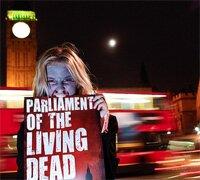Are ID Cards dead?
As so many people have already pointed out, the loss of the UK’s child benefit database is a disaster for the government. The incompetence beggars belief. This data is so important it should be treated like the launch codes for a nuclear weapon – there is nothing indicating that people were taking it anything like that seriously.
Until the discs are recovered (if they ever are), it seems to me there will be little way of knowing whether they are or have been used for fradulent purposes, who has copied the information, where it might have been sent to, in what new formats. Of the 25 million people who have been put at risk, some are bound to be victims of identity fraud, by sheer law of averages. Each time one of them is it will make another negative headline – whether they were actually connected to these lost CDs or not. Iain Dale has also pointed out that some or all of the people exposed could, theoretically, sue the government (though they would, in effect, be suing themselves). The amount of negative publicity could be endless.
Let us assume, then, that this Labour government is toast, and that we can expect a Conservative government in 2010 at the latest. What does it mean for ID cards?
According to the Home Office’s ID card implementation plan (opens pdf – timetable on page 27) the government plans to start issuing ID cards to British citizens at around the end of 2009 – by which time the massive database they need will already exist (it will just need filling in). This is when people will really start to feel this scheme in action – when they have to start carrying the things around, when they have to start paying for them, when they have to start registering. The Lib Dems have promised not to register at all. No2ID and others will undoubtedly organise mass demonstrations. If Gordon Brown is insane enough to push on with them anyway, just months before an election, then the Conservatives will promise to scrap them when they come in (as they already have).
I’m sure they will deliver on that promise. But, as Guy Herbert of No2ID has written on these pages:
‘ID cards’ are the concrete expression of this register, but strictly speaking are not necessary: numbering you and making constant reference to the central file will do
There is a third way option, then, which Cameron could take. Why not ditch the actual ID cards, but keep the database? Keep recording biometric data for all visa applicants, etc., but don’t push on through with the idea of forcing everyone to carry their card? When the Tories come in they will be confronted with this choice. Junk the entire database, and try and roll back to the way things were. Or junk the concrete expression, at which point most people will probably forget about the database behind them. I believe they will come in, talk to the civil servants in charge of the scheme, be convinced of the difficulty of rolling back, and take the second option. This presents those of us who are against the idea of a ‘database state’ with a serious problem – the flashpoint moment of resistance, when people can make an obvious stand, can easily be dodged.
I personally believe a centralised database state an inevitability. The real question then becomes, not how do we ’stop it’, but what powers we (as a people) need to possess be able to live with one. The power to immediately sack members of an administrative department that do not treat this data with the seriousness it deserves seems like an obvious start.
(cross-posted from OurKingdom)
-------------------------
| Tweet |
This is a guest post. Jon Bright is managing editor of the OurKingdom blog.
· Other posts by Jon Bright
Filed under
Blog ,Civil liberties ,Crime
3 responses in total ||
One thing that irritates me about the debate on this issue is over the meaning of “voluntary”. I recall that ID cards were initially going to be “voluntary” because you would register for one when you applied for or renewed your “voluntary” passport. Also, it seems we have already “volunteered” information to various government departments already.
So the key moment of no return is when the “voluntary” aspect of the scheme is removed. When you can no longer write or call a company or agency and ask for your details to be withdrawn from the database.
Perhaps a useful use of this site would be to compile a list of government agencies, the information they hold on you, and the ease of removing that data, should one so wish. That way we can see the chinks in the armour, and the point at which the “database state” can no longer be rolled back. I fear we are halfway there already.
Only half way, Robert? You’re a lot less cynical than I
I think Robert might be “sleepwalking” ![]()
Reactions: Twitter, blogs
Sorry, the comment form is closed at this time.
You can read articles through the front page, via Twitter or RSS feed.
» John Pilger shames himself by attacking feminists over Julian Assange
» Why Labour was right to reject Bob’s drug policy
» Ten myths about housing benefit reforms in London
» What if Superdrug lived up to its name?
» Why we want to ‘recall’ Aaron Porter as NUS President
» Breakthrough in drugs debate as MPs call for full decriminalisation
» Report shows how the promise on NHS spending has been broken
» Why climate talks in Cancun failed miserably
» Why cuts to local councils will be much worse than Tories suggest
» Left unity and the bid to oust Aaron Porter
» The true horror of NHS privatisation is slowly coming out
|
26 Comments 15 Comments 4 Comments 15 Comments 46 Comments 39 Comments 34 Comments 19 Comments 33 Comments 34 Comments |
LATEST COMMENTS » Unity posted on John Pilger shames himself by attacking feminists over Julian Assange » Torquil MacNeil posted on John Pilger shames himself by attacking feminists over Julian Assange » Mat M posted on Ten myths about housing benefit reforms in London » Vincenzo Rampulla posted on Ten myths about housing benefit reforms in London » the a&e charge nurse posted on John Pilger shames himself by attacking feminists over Julian Assange » Planeshift posted on Ten myths about housing benefit reforms in London » cjcjc posted on 49 universities are or were under occupation » Shatterface posted on Why Labour was right to reject Bob's drug policy » Watchman posted on 49 universities are or were under occupation » conspiracy theo posted on I know how let down Libdems must feel » Dunc posted on Why Labour was right to reject Bob's drug policy » Unity posted on John Pilger shames himself by attacking feminists over Julian Assange » Watchman posted on John Pilger shames himself by attacking feminists over Julian Assange » Tim Worstall posted on Why Labour was right to reject Bob's drug policy » DaveHill posted on Ten myths about housing benefit reforms in London |















